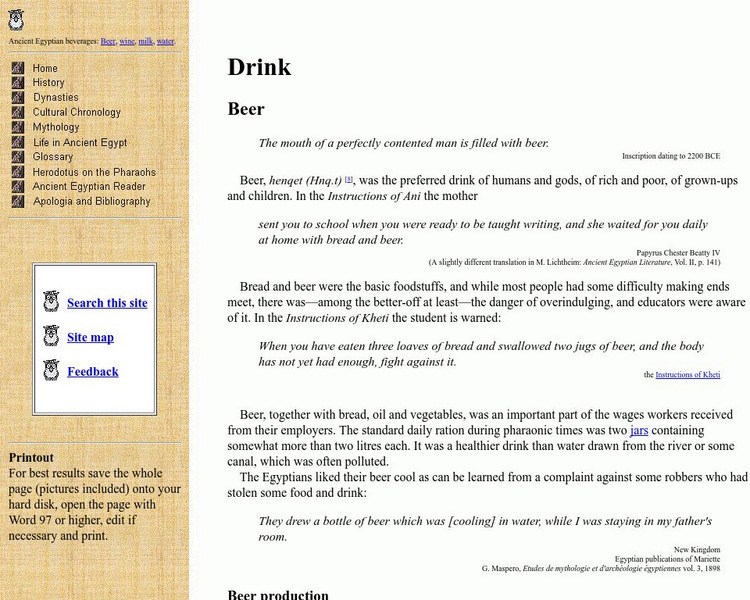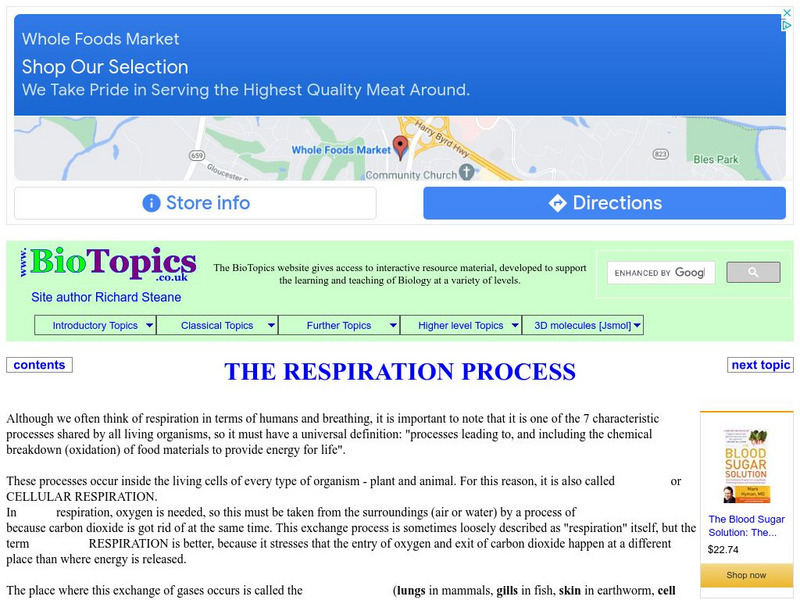TED Talks
Ted: Ted Ed: You Are Your Microbes
From the microbes in our stomachs to the ones on our teeth, we are homes to millions of unique and diverse communities which help our bodies function. The following learning module emphasizes the importance of understanding the many...
Curated OER
Exploratorium: The Science of Pickles
What is pickling? What role does fermentation play in food? What is salt brine? Understand this and more at the Exploratorium.
Curated OER
Exploratorium: The Science of Pickles
What is pickling? What role does fermentation play in food? What is salt brine? Understand this and more at the Exploratorium.
Biotechnology Institute
Biotechnology Institute: Your World: Industrial Biotechnology [Pdf]
Read about three products of biotechnology and genetic engineering while getting a glimpse of the technologies behind these products. Also learn how science and engineering can make industrial products to be sold commercially.
Science Buddies
Science Buddies: Yeast Reproduction in Sugar Substitutes
There's nothing quite like the smell of fresh-baked bread to make your mouth water. As any baker can tell you, you can't bake bread without yeast. This project makes clever use of bread dough to measure yeast reproduction three different...
Science Buddies
Science Buddies: Yogurt Cultures
Find out in this experiment how good bacteria can turn milk into a treat by investigating the optimal starter cultures for making yogurt from whole milk.
Science Buddies
Science Buddies: Yeasty Beasties
While looking at a package of dry yeast it is hard to believe it is alive. But add the right ingredients and presto, the mixture becomes a bubbly, oozing, mess of life. What are the right ingredients? Do this experiment and figure it out...
TeachEngineering
Teach Engineering: Cellular Respiration and Population Growth
Two lessons and their associated activities explore cellular respiration and population growth in yeasts. Yeast cells are readily obtained and behave predictably, so they are very appropriate to use in middle school classrooms. In the...
TeachEngineering
Teach Engineering: What Do Bread and Beer Have in Common?
Students are presented with information that will allow them to recognize that yeasts are unicellular organisms that are useful to humans. In fact, their usefulness is derived from the contrast between the way yeast cells and human cells...
Savvas Learning
Pearson's the Biology Place: Cell Respiration
This excellent interactive website about cellular respiration provides an overview then goes into the details that can be so difficult to understand. The practice, review, and quiz pages should help solidify understanding.
Ohio State University
Ohio State University: Respiration
Informative text is clearly written and supported by good illustrations and charts as well. A quiz is also provided at the bottom of the site.
Open Curriculum
Open Curriculum: Anaerobic Respiration
This study information will help you distinguish between obligate aerobes, obligate anaerobes, and facultative anaerobes.
Other
Science of Cooking: Acetic Acid
Here are details on acetic acid, which provides vinegar with its sour taste. This article offers information on this chemical's nomenclature, history, properties, production, and fermentation.
BiologyWise
Biology Wise: Bacteria That Are Helpful to Humans and the Environment
Describes the ways that bacteria benefit humans, the environment, and other things, such as through the process of fermentation and the treatment of sewage.
Colorado State University
Colorado State University: The Large Intestine
Gives a description of some of the functions performed by the large intestine. Includes links to more information.
CK-12 Foundation
Ck 12: Biology: Prokaryote Habitats
[Free Registration/Login may be required to access all resource tools.] Describes the range of habitats that prokaryotes occupy.
Science Struck
Science Struck: Examples of Chemistry in Everyday Life
Gives examples of chemical interactions occurring in the human body, in the world around us, in foods, and in products we use.
National Inventors Hall of Fame
National Inventors Hall of Fame: Louis Pasteur
This site provides general information on Louis Pasteur (1822-1895 CE) and his patent number 135,245. The site also describes how he created pasteurization.
Andre Dollinger
Reshafim: Beverages
Learn about the beverages the Egyptians drank, how they were produced, and in what rituals they were used. A very comprehensive look at Egyptian drink.
Khan Academy
Khan Academy: Alcohol Production and Absorption
Read a passage about alcohol production and absorption and answer the follow-up questions to practice for the MCAT.
Bio Topics
Bio Topics: The Respiration Process
This site provides a brief description of aerobic and anaerobic respiration. In addition, there are several learning exercises to reinforce and check understanding of the concepts presented.
Smithsonian Institution
Smithsonian American Art Museum: Hans Hofmann
Hans Hofmann is profiled at this site in a format that begins with a brief biographical sketch of his life. His works are then listed by appearance in the museum's database. Each work is presented in thumbnail format with brief...
University of Missouri
Umsl: Microbes in Action: Cultivation of Bacteria From Yogurt [Pdf]
Observe the two species of bacteria that are found in yogurt by cultivating them on agar plates. In this lab, students will use microbiology techniques to explore these anaerobes. Lesson plan gives a lab procedure, teacher instructions,...
Other popular searches
- Yeast Fermentation
- Yeast Fermentation Labs
- Glycolysis and Fermentation
- Anaerobic Fermentation
- Alcoholic Fermentation
- Glycolysis Fermentation
- Lactic Acid Fermentation
- Alcohol Fermentation
- Yogurt Fermentation Lab
- Respiration Fermentation
- Fermentation Lab
- Yeast Fermentation Balloon















